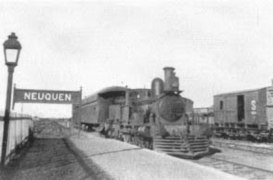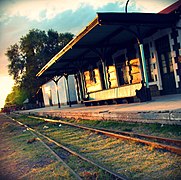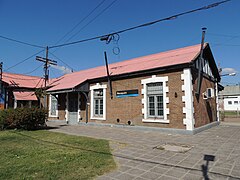Neuquén railway station
Ferrosur Roca (freight)
Neuquén is a train station in the homonymous city in Argentina, which is served by the Ferrosur Roca's Zapala-Bahía Blanca freight service and the Tren del Valle commuter service. Situated on the Central Park in the city center, adjoining other historical railway constructions such as the Emilio Saraco Art Gallery, it was declared a building of historical relevance by the National Government.[1] Opened in 1902, the station played a significant role in the region's development and the decision to declare it the capital of the National Territory, which was to become the current Province in 1955.[2]
History

Amid the expansion of the Buenos Aires Great Southern Railway to connect the Neuquén National Territory with Buenos Aires in view of a potential armed conflict with Chile, the railway bridge over the Neuquén River was finished in 1902 and the station was opened the same year.[3] The train connection with the national capital was one of the key factors when governor Bouquet Roldán decided to move the National Territory capital from Chos Malal in the north to the then-newly founded town on the confluence of the Neuquén and Limay rivers, which had existed since the last decades of the 19th century under the name Paraje Confluencia.[2] The city started growing around the train station, situated in the area which is the current Central Park.[4]
Neuquén became an intermediate station on the line running from Constitución station to Zapala via Bahía Blanca for both freight and passenger services, the latter being discontinued in 1991 during the nationwide railway privatisation. From 1916 to 1931 there was the intercity passenger line between Neuquén and Chichinales, which was resumed in 2015 only between Neuquén and Cipolletti with plans of being expanded from Plottier to the old east end station.[5]
Architecture
The station was officially declared a building of historic interest by the National Government in 2014.[1] It was built at the beginning of the 20th century by the British-owned company Buenos Aires Great Southern Railway, which designed it in the style of a British railway building of the time. Some of its characteristics are facede with exposed brick walls, galvanized sheet roofing, spruce floors, green flagstone baseboards and different wooden structures, such as doors, windows and platform eaves.[6] Some of the original structures and other elements have been kept since its construction in 1901, such as the clock, ticket offices and waiting rooms.[7]
Services
Since its inauguration the station has been served by the Zapala-Bahía Blanca freight line, operated by the company Ferrosur Roca as of 2020.[8] The commuting train Tren del Valle, connecting the city with the neighbouring Cipolletti in the Río Negro Province has been re-established in 2015. The line was expanded to its west end in Plottier in 2021.[9] A further expansion from Plottier to as far as Chichinales to the east across the Upper Valley of the Río Negro river has been discussed.[10]
Different plans have been considered to build a freight line connecting the petroleum reservoir Vaca Muerta near Añelo and the agricultural region of the Upper Río Negro Valley with the Bahía Blanca harbor, being Neuquén one of the stops.[11]
Operators
| Company | Period |
|---|---|
 BA Great Southern BA Great Southern | 1901–1948 |
 Ferrocarriles Argentinos Ferrocarriles Argentinos | 1948–1993 |
 Ferrosur Roca [note 1] Ferrosur Roca [note 1] | 1993–present |
 Trenes Argentinos Trenes Argentinos | 2015–present |
- Notes
- ^ Only freight services.
Gallery
-
 The station in 1900s
The station in 1900s -
 The station in 2010
The station in 2010 -
 Train stopped, 2015
Train stopped, 2015 -
 Train in 2016
Train in 2016 -
 Back view of the building, 2021
Back view of the building, 2021
See also
References
- ^ a b "Lugares históricos Nacionales: Declárese bien de interés histórico a la estación ferroviaria Neuquén, en el Departamento Confluencia, Provincia del Neuquén". Información Legislativa (in Spanish). Retrieved November 29, 2020.
- ^ a b Bandieri, Susana; Favaro, Orietta; Morinelli, Marta (1993). Historia de Neuquén. Plus Ultra. p. 129. ISBN 950-21-1092-7.
- ^ "La llegada del tren: clave para el traslado de la capital". Cooperativa Calf (in Spanish). 2020. Retrieved December 2, 2020.
- ^ "La historia de Neuquén y el ferrocarril". Neuquén Informa (in Spanish). September 27, 2012. Retrieved December 3, 2020.
- ^ "El último tren". Río Negro (in Spanish). December 7, 2002. Retrieved December 2, 2020.
- ^ "Se declara de interés histórico la estación ferroviaria de Neuquén". Justice and human rights ministry of Argentina (in Spanish). April 9, 2014. Retrieved December 2, 2020.
- ^ "Neuquén capital: Edificios y monumentos históricos". Guía Patagonia Activa (in Spanish). Retrieved December 4, 2020.
- ^ "La red operada". Ferrosur Roca (in Spanish). Retrieved December 3, 2020.
- ^ "Después de 28 años el tren vuelve a Plottier". Argentina's Official Site (in Spanish). March 19, 2021. Retrieved April 7, 2021.
- ^ "El tren de Cipolletti a Chichinales, el proyecto que duerme en un cajón". Río Negro (in Spanish). April 19, 2018. Retrieved December 3, 2020.
- ^ "Cómo es el tren que unirá Vaca Muerta con Bahía Blanca". Perfil (in Spanish). September 29, 2020. Retrieved December 3, 2020.

- v
- t
- e
| City | |
|---|---|
| Province |
|
- Neuquén
- Antártida Argentina
- Barrio Vila
- Mariano Moreno (FCPSF)
- Rosario (FCCC)
- Rosario (FCOS)
- Rosario Central (FCCA)
- Rosario Norte (FCBAR)
- Rosario Oeste (FCCC)
- Rosario Sur (FA)
- Santa Fe (Belgrano)
- Santa Fe (Mitre)
- Sarratea
 Category
Category Commons
Commons


















